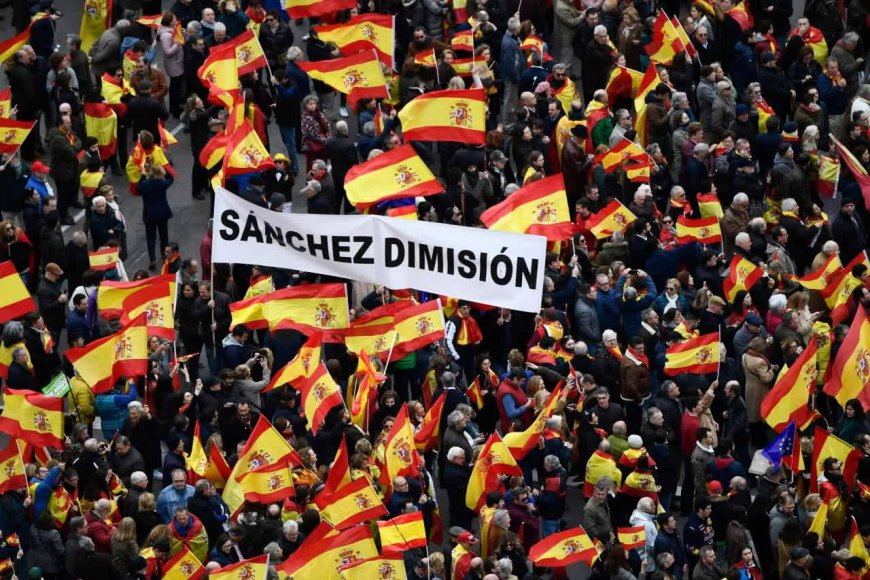Will Spain’s Sánchez Deliver on Promises? Economic Negotiations and Amnesty Law Under Scrutiny
The Spanish elections held in July served as a stark reminder of the deep divisions that exist within Spanish society. Two prominent political factions emerged as major contenders: the far-right currents led by Núñez Feijóo, and the Socialists led by Pedro Sánchez. These two groups secured the largest number of seats in parliament, reflecting the diverse political landscape of Spain.

However, in light of their failure to secure a clear parliamentary majority, these parties must now seek alliances with other factions to form a coalition government. Notably, Pedro Sánchez's openness to cooperating with independence-seeking parties in Basque and Catalan regions grants him a higher chance of forming a government.
Despite widespread opposition from the right-wing factions and even massive street demonstrations against Sánchez’s policies, he astoundingly managed to secure 179 votes in parliament, thus extending his term as prime minister. The question arises: What transpired within the parliamentary session that led to this unexpected outcome?
The two-day mass protests in Madrid, specifically organized by the far-right Vox party to pressure Sánchez, amplified tension within the country's parliament. The aim of these right-wing currents was to overshadow the parliamentary proceedings with street demonstrations, thereby exerting pressure on the prime minister.
Simultaneously, the extreme right-wing factions eagerly awaited any faux pas from Sánchez that they could exploit to further fuel the protests. Moreover, if the prime minister had adopted a harsh stance against the protesters, it could have exacerbated the situation. The demonstrators firmly believe that the proposed amnesty law for separatist leaders, promised by Sánchez in exchange for their support in forming a coalition government, undermines Spain’s national unity and exacerbates the country's ethnic fragmentation. Sánchez, however, vehemently rejects these claims and argues that such a law serves the cause of democracy in Spain.
The parliamentary session revolved around two critical issues. Firstly, it demanded a long-awaited clarification from the prime minister candidate, Sánchez, regarding the amnesty law negotiated with the Catalan independence movement. Secondly, it sought to address the prevailing atmosphere of institutional discredit that Spain currently grapples with—a situation predominantly fueled by right-wing movements. This perilous milieu, coupled with the ongoing street demonstrations, presented yet another pressure point against the new administration.
In his speech, the socialist candidate commenced by paying respect to those who peacefully protested against his plans in recent days. However, it took him one hour and twenty-five minutes to mention the word "amnesty." Sánchez utilized this time to elucidate the rationale behind the challenging deals he has brokered, including the amnesty measures that he previously rejected, emphasizing the necessity of preserving a progressive coalition within the government. Notably, Sánchez did not consider several factors, such as preventing the growth of the extreme right, to be ineffective in reaching this decision. As a matter of fact, Sánchez endeavored to manage the tense atmosphere and avoid further fueling disputes.
Furthermore, Sánchez painted a global scenario marked by various challenges, including the war in Ukraine, the Middle East conflict, climate change, and the growing inequalities deteriorated by the development of artificial intelligence (AI). He stressed that failure to address these insecurities could escalate into anger and frustration, ultimately undermining democracy itself. The prime minister presented his government's policies of the past five years, as well as his future plans, as a bulwark against a series of "regressive" measures proposed by the PP-Vox alliance (center-right and far-right) in local and regional governments. Sánchez emphasized that these measures primarily affect the concerns of ultraconservatives, such as climate challenges, gender equality, and immigration, which his government seeks to address.
In his speech, Sánchez aimed to offer justifications for his most controversial decision and urged representatives to vote in favor of the amnesty law. However, they found his explanations lacking clarity, failing to elucidate the rationale behind his change of position. This became evident in the voting process, where his opponents abstained from supporting him.
Looking ahead, the first task of Sánchez's administration will be to draft and ratify the national budget for the upcoming year, necessitating a delicate balance between broad social proposals and the fiscal discipline mandated by Brussels in the aftermath of the global pandemic. Additionally, the immense challenge of amnesty for Catalonia's leaders faces criticism from the Spanish judiciary and scrutiny from the European Union. Failure to deliver on promises of an amnesty law and economic negotiations with pro-independence regions could jeopardize Sánchez's parliamentary majority, potentially leading to a re-election—a challenge that Spain would have to confront.
Sánchez appears determined to mend the divisions and political polarization that have plagued Spanish society, as he expressed in his speech. Nevertheless, the extent to which his opponents will obstruct the path to achieving these goals, particularly given his government's perceived anti-Israeli tendencies, remains uncertain. The future will reveal whether sufficient time exists to bridge these gaps or if they will deepen, necessitating a re-election.













































